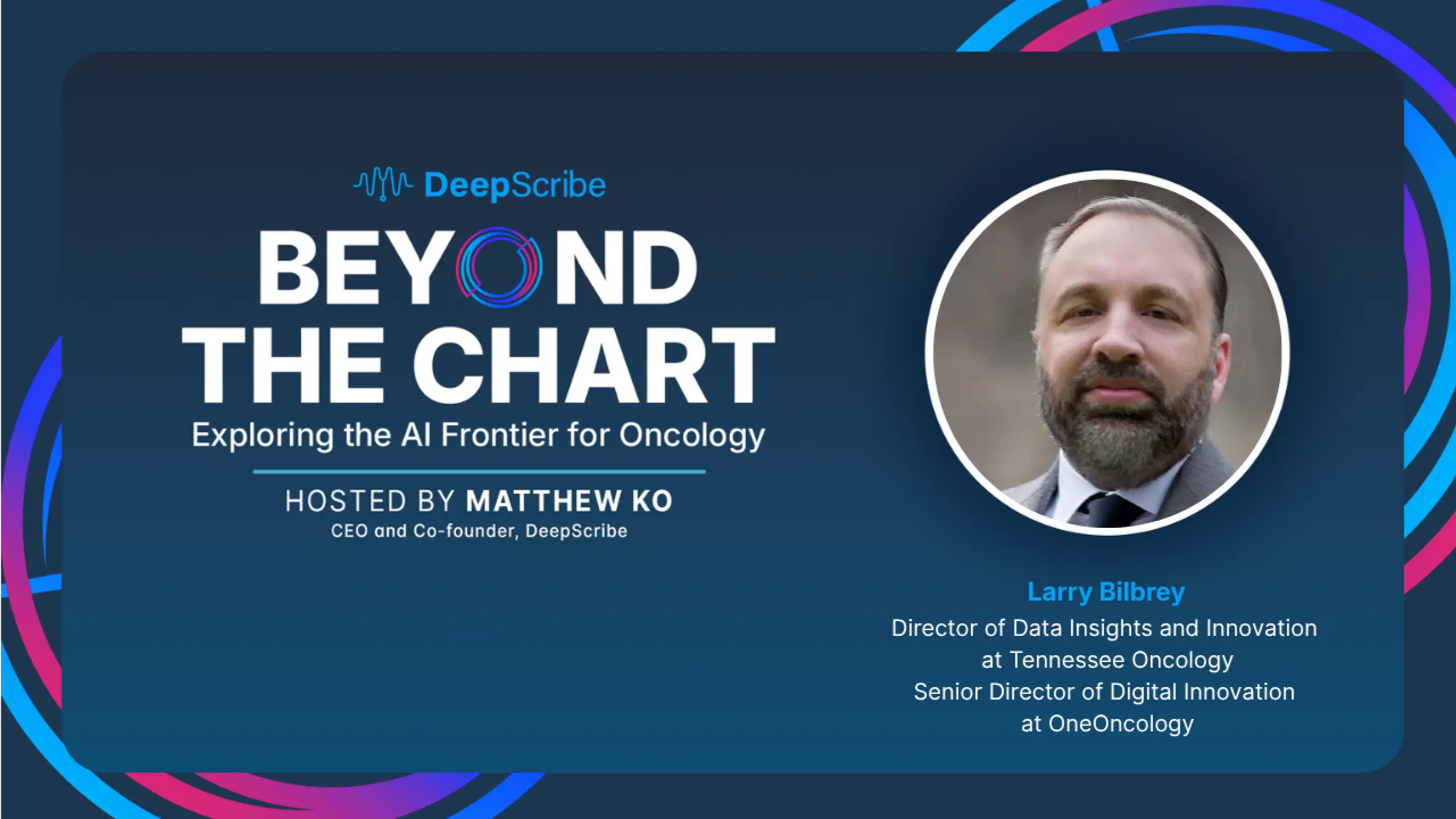The Hidden ROI of Innovation: How AI Is Unlocking the Future of Cancer Care with Larry Bilbrey, OneOncology
The noted innovation leader talks about ambient AI restoring humanity in medicine, and holding data potential that can change care delivery.


In oncology, innovation is rarely about chasing the next big thing. It’s more about solving the right problems in the right order. Few people understand that balance better than Larry Bilbrey, a forward-thinking leader working at both the local and national level: Larry is Director of Data Insights and Innovations at Tennessee Oncology and Senior Director of Digital Innovation at OneOncology.
On the podcast Beyond the Chart, Larry and DeepScribe founder and CEO Matthew Ko explore how real transformation happens inside one of the largest community oncology practices in the nation.
Larry leads with realism. For a physician-owned practice, every investment must be weighed against patient care and sustainability. Quoting a Tennessee Oncology C-level executive, Larry asks, “Would you spend a dollar to make two, or to save two?”
In a world where every dollar funds direct patient care, ROI isn’t an abstract concept — it’s a lifeline.
That tension between mission and margin often defines the frontier of healthcare innovation. It’s also where Larry Bilbrey believes AI can do the most good, if implemented thoughtfully.
Redefining ROI: Tracking Revenue *and* Restored Time
Oncology groups may look to productivity gains or cost savings as measurable returns on investment. But for Larry, the real value is in what AI gives back to clinicians: time, presence, and peace of mind.
When Tennessee Oncology piloted DeepScribe’s ambient AI documentation, even skeptics were surprised. Larry talks about one veteran physician, initially resistant to the technology, quickly realizing that he no longer had to take charts home to complete his documentation. His entire weekend had been returned to him.
“That quality-of-life change for him, just in one week, was massive,” Larry says. “There’s ROI there.”
As ambient AI becomes more prevalent — we’ve seen “ubiquitous” used in many publications lately — this life change for physicians is shifting the ways community oncology defines success. For many clinicians, the return on investment for AI is beyond a spreadsheet metric. It’s the ability to practice medicine as they had intended, or even envisioned.
Ambient AI and the Hidden Power of Unstructured Data
Behind every oncology visit lies a rich but untapped source of insight: the physician’s note. For decades, these records of care have lived as unstructured data, with longitudinal patient understanding requiring manual search work.
This wealth of information about the patient and care they receive is what Larry calls the holy grail of healthcare data. Ambient AI is finally unlocking it.
“When you look at physician notes, pathology reports, scanned faxes, so much critical detail has been trapped,”
"AI scribes like DeepScribe are transforming that narrative into discrete, actionable data," he explains. "That changes everything, from how we measure outcomes to how we support clinical decisions.”
By converting ambient conversation into structured data insights, practices can finally surface the patterns within millions of patient encounters. This use of the patient narrative points to a standard where data informs care in real time. Here’s where innovation grows from the ground up, based on the actual conversations taking place during the delivery of care.
The Future of Clinical Decision Support
For Larry Bilbrey, the next decade in oncology is about empowering clinicians.
“The biggest challenge is getting relevant data in front of the physician at the point of care,” he says.
“If we can make sure the most recent scans, biomarkers, and labs are right there — contextualized and clear — that’s where AI will make the biggest impact.”
It’s a vision that’s both hopeful for what innovation can bring and pragmatic about actual use cases. The future of clinical intelligence isn’t about algorithms replacing human judgment. It’s about helping oncologists stay ahead in a world where medical information is estimated to double every 73 days.
Larry believes that as AI tools mature, they’ll evolve from assistants to collaborators, helping clinicians see what matters most, right when it matters most.
Restoring the Human Connection in Cancer Care
From this integration of AI into clinical care, Larry Bilbrey sees a profound, overarching impact: the return of true presence in patient care.
“The one thing we’ve all lost sight of is the face-to-face, intimate contact of a patient visit,” he says.
“With AI scribes, physicians are looking up, not down. They’re having meaningful conversations again.”
That reconnection between clinician and patient does more than just improve satisfaction metrics. It’s the very foundation of care quality and trust, the building blocks of resilience for oncology teams, who navigate some of medicine’s hardest moments.
“Technology built the barriers,” says Larry. “But AI might just be the thing that makes us human again.”
Building for the Next Generation of Care
As the podcast conversation closed, Larry advised technology leaders on what to keep in mind as they design for oncology: understanding your customer, sharing the risk, and building for a breadth of use cases, not just a single pain point.
Innovation in oncology isn’t won through hype cycles or point solutions. It’s built through trust, integration, and a deep respect for how care actually happens.
Technology companies who take that all into account are those that are truly aligning and resonating with leaders like Larry Bilbrey. Together, they’re investing in the next generation of cancer care, an environment in which ambient AI that’s purpose-built for oncology is the foundation for connections that improve care and its delivery.
Watch the full episode to hear how the power and potential of AI is changing the perception of what's possible in healthcare.
text
Related Stories
Realize the full potential of Healthcare AI with DeepScribe
Explore how DeepScribe’s customizable ambient AI platform can help you save time, improve patient care, and maximize revenue.




